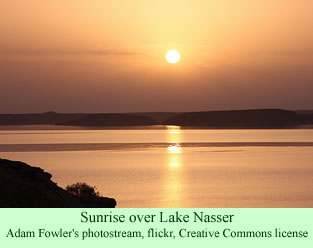Last month, the Nubian people were not discussed during the celebrations in Egypt marking the 50th anniversary of the construction of the High Dam at Aswan, even though the reservoir destroyed much of Old Nubia. Haggag Oddoul, a prominent Egyptian Nubian writer who lives in Alexandria, told a reporter from the Web-based news source Al-Monitor that the “lack of any talk about the rights of Nubians during the celebrations marking the anniversary of the High Dam is a strong indicator that this issue is being ignored again.”
 Oddoul has been a forceful advocate of the Nubian right to return to new villages on the shores of Lake Nasser, the reservoir created by the impoundment of the Nile. He was one of the 50 members of the committee last fall that drafted a new constitution for Egypt after the military ousted former President Mohamed Morsi.
Oddoul has been a forceful advocate of the Nubian right to return to new villages on the shores of Lake Nasser, the reservoir created by the impoundment of the Nile. He was one of the 50 members of the committee last fall that drafted a new constitution for Egypt after the military ousted former President Mohamed Morsi.
Reviewing the work of the committee, he said that he and the other Nubians had been successful in adding article 236, which “obliged the state to return Nubian residents to their original regions within a period of 10 years.” He added that article 53 outlawed discrimination on the basis of skin color or race, an issue that Nubians in Egypt have constantly had to contend with.
But guarantees written into the constitution mean little unless they are implemented, Oddoul said. He believes that there are major interests in Egypt that want to derive economic benefits from having access to the lands along the Nile, to which the Nubians feel they are entitled.
Abdel Daim Azzedine, a Nubian activist in Aswan, argued that the state needs to talk with their young people to prevent them from protesting about being ignored. “If the policies of ignoring us continue, we intend to take to the streets to demand our rights,” he said. In other words, the traditional peacefulness of the Nubians will not continue indefinitely.
He pointed out that the government of Egypt has earned billions of Egyptian pounds off of revenues from the High Dam, especially from the sale of electricity and from tourism. He added that the Nubians “are the only losers in this project, and what is happening with us is nothing other than attempts at ethnic cleansing.”
Mr. Azzedine told the Al-Monitor reporter that the resettlement housing provided by the government in the 1960s before the dam was finished was far from the Nile, in the desert, without any nearby sources of livelihoods. “We saw this as a kind of marginalization,” he said. He added, “we are not seeking to secede or take up arms and violence. … The illusion of separation is only in the imagination of the Egyptian security apparatus. But the continuation of policies of marginalization has prompted Nubian youth to resort to violence.”
Al-Monitor spoke with activist Nayef Hamid from Sudan, a Nubian who indicated that the Nubians in his country also suffered from displacement caused by the High Dam. Their cause in both countries is a single issue, he said, and the government of neither country has dealt with what he referred to as the marginalization and ethnic cleansing of the Nubian people.
Mr. Hamid said that the Nubians of Sudan were strongly opposed to the construction of two additional dams, which their government has proposed. Their protests have not been entirely peaceful, as fighting between state forces and protesters on June 30, 2008, left four Sudanese people dead.